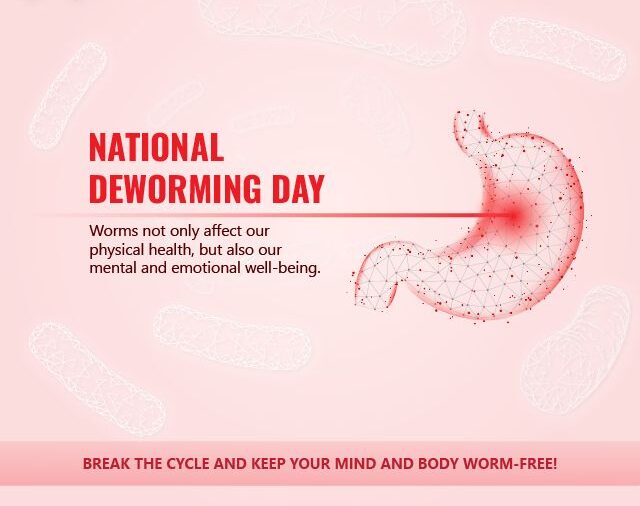🪱 National Deworming Day: All You Need to Know About This Lifesaving Campaign in India
📜 History of National Deworming Day
Launched in 2015, National Deworming Day (NDD) is an initiative by the Ministry of Health and Family Welfare, Government of India, with support from the World Health Organization (WHO) and Evidence Action’s Deworm the World Initiative. This mass public health campaign aims to eliminate soil-transmitted helminths (STH) or intestinal parasitic worms, which severely affect the health, nutrition, education, and overall development of children.
- 🪱 National Deworming Day: All You Need to Know About This Lifesaving Campaign in India
- 📜 History of National Deworming Day
- 📅 Timeline & Evolution of the Campaign
- 🧠 Key Facts About Deworming in India
- ❓FAQs About National Deworming Day
- Q1. What is the purpose of National Deworming Day?
- Q2. Are the deworming tablets safe?
- Q3. Why is deworming important for school performance?
- Q4. What are the common symptoms of worm infection in children?
- Q5. Is deworming needed for adults too?
- 🎯 Significance of National Deworming Day
- 🙌 How is National Deworming Day Observed?
- ✨ Powerful Impacts in Our Daily Lives
- 💡 Why National Deworming Day is So Important to Society
- 🎁 Wishing Message for National Deworming Day
- 📌 Important Points to Remember
- 🧭 Conclusion: Why This Day Should Not Be Ignored
The vision was simple but revolutionary:
“A worm-free India, healthy children.”
This program targets all children aged 1–19 years, including pre-school and school-going children, through schools, anganwadi centres, and outreach programs. It is one of the largest deworming programs in the world.
📅 Timeline & Evolution of the Campaign
| Year | Major Milestones |
|---|---|
| 2015 | First round launched on February 10, covering 11 states. |
| 2016 | Expanded to all states and UTs, conducted twice a year – February 10 and August 10. |
| 2017-2019 | Strengthened school and community outreach with support from NGOs. |
| 2020 | Adjusted methods due to COVID-19, home delivery and supervised consumption introduced. |
| 2021-2023 | Reinstated full-scale drives with better reporting systems, digitization. |
| 2024 | Introduced mobile-based monitoring and AI analysis of program reach. |
🧠 Key Facts About Deworming in India
Over 240 million children in India are at risk of parasitic worm infections.
Soil-transmitted helminths spread through contaminated soil, water, and food.
Worm infections impair nutritional intake, causing anemia, malnourishment, and cognitive delays.
Deworming tablets used are Albendazole 400 mg — safe and WHO-approved.
WHO recommends bi-annual deworming for children in endemic regions.
India conducts two NDD rounds annually – on February 10 and August 10.
Teachers, anganwadi workers, and ASHAs are trained to administer the tablets.
❓FAQs About National Deworming Day
Q1. What is the purpose of National Deworming Day?
A. To deworm all children between 1–19 years of age to reduce the burden of parasitic infections and ensure better health and education outcomes.
Q2. Are the deworming tablets safe?
A. Yes. The Albendazole tablets used are safe, free of cost, and approved by the World Health Organization.
Q3. Why is deworming important for school performance?
A. Worm infections reduce concentration, energy, and learning capacity. Deworming helps children grow physically and mentally.
Q4. What are the common symptoms of worm infection in children?
A. Stomach pain, weight loss, fatigue, vomiting, diarrhea, and nutritional deficiencies.
Q5. Is deworming needed for adults too?
A. Although NDD focuses on children, adults in high-risk areas like agriculture or sanitation workers may also benefit from periodic deworming.
🎯 Significance of National Deworming Day
Healthier Children: Worm-free children experience better growth and development, with improved immunity.
Enhanced School Attendance: Fewer infections mean fewer school days missed.
Cost-Effective Public Health Measure: Deworming costs less than ₹2 per child, making it highly scalable.
Nutrition Boost: Reduced worm load improves nutrient absorption, crucial in a country with widespread child malnutrition.
Gender Equity: Deworming promotes better health outcomes for both girls and boys, contributing to gender-balanced development.
🙌 How is National Deworming Day Observed?
Deworming at Schools and Anganwadi Centres: Supervised administration of Albendazole tablets.
Mop-Up Day (After 2 Days): For children absent on NDD.
Awareness Campaigns: Posters, pamphlets, rallies, radio, and community announcements.
Training of Health Workers: Frontline workers trained in safe administration and side-effect management.
Monitoring & Reporting: Digital platforms and registers ensure accountability and coverage.
✨ Powerful Impacts in Our Daily Lives
Better Childhood Immunity: Children get sick less often.
Reduced Anemia & Fatigue: Especially important for adolescent girls.
Increased Productivity: Healthier children grow into more capable, productive adults.
Hygiene Awareness: Children learn about handwashing and sanitation through NDD lessons.
Community Health Improvement: Mass deworming reduces parasite transmission in entire communities.
💡 Why National Deworming Day is So Important to Society
Breaks the Cycle of Poverty and Disease: Healthy children = better education = better jobs.
Builds a Resilient Nation: Healthier youth are the foundation of India’s demographic dividend.
Equity and Access: Even children in the most rural or tribal belts receive equal care.
Public-Private Partnerships: NGOs, schools, media, and local government collaborate in this massive exercise.
🎁 Wishing Message for National Deworming Day
🗓️ “On this National Deworming Day, let’s pledge for a healthier, worm-free future for every child in India. A simple tablet today can lead to a stronger tomorrow. Let’s unite for better health and brighter smiles!” 🌟
📌 Important Points to Remember
Celebrated twice a year: February 10 and August 10
Focuses on children aged 1–19 years
Targets soil-transmitted helminths
Administered via schools and anganwadis
Free Albendazole 400 mg tablets
Supervised by trained staff
Supported by WHO, UNICEF, and national health partners
🧭 Conclusion: Why This Day Should Not Be Ignored
In a country like India, where nutrition, education, and hygiene are ongoing developmental challenges, National Deworming Day emerges as a silent yet powerful revolution. It may not make headlines every year, but it shapes the very core of public health and child development.
By ensuring that every child receives a small but vital tablet, India is building a healthier, stronger, and more educated generation—one that is free from parasites, empowered to learn, and ready to lead.
So, the next time you hear about National Deworming Day, remember:
It’s not just about deworming — it’s about dignity, health, and hope.









Wonderful work! This is the type of information that should be shared around the internet. Shame on the search engines for not positioning this post higher! Come on over and visit my website . Thanks =)